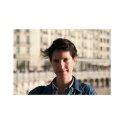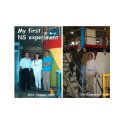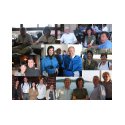Arantxa Arbe
Research Professor at the Spanish National Research Council (CSIC), Spain
(Information collected in May 2010)
Your studies? Scientific field?
I obtained a degree in Solid State Physics at the University of the Basque Country (UPV/EHU), in Bilbao (Spain). My Thesis (San Sebastian, UPV/EHU) was focused on the study of the dynamics of glass-forming polymers by combining neutron scattering and dielectric spectroscopy. Almost twenty years later, I still try to understand how polymers (and other soft materials) move at different length scales. It can be really complicated! To approach this problem, our group in San Sebastian combines different experimental and modeling approaches. I am the responsible of the application of scattering techniques.
Neutron-scattering background?
I was very lucky to perform my first neutron scattering experiments at the very beginning of my PhD-period [see Figure 1(a)], just before the ILL shut down. It was a great experience I will never forget. My Thesis was based on those experiments, together with dielectric measurements. I then moved to Jülich for a Postdoc stay in the group of Dieter Richter -a perfect place to learn more about neutron scattering!
I was never directly involved in instrumentation, but during my scientific carrier I have performed many (I would estimate more than 100!) experiments on different neutron sources in Europe and USA. I also learnt a lot during my participation as 'Young Scientific Member' in the Scientific Advisory Committee of the European Spallation Source (ESS) project (2001-2002). There I had the opportunity to meet excellent researchers in this field. Some representative examples can be seen in Figure 2.
Step by step to my position?
I did my PhD under the supervision of Juan Colmenero. This period was followed by my Postdoc stay in Jülich. After that, I came back to the group of Juan Colmenero in San Sebastian. I first had a posdoctoral contract and then an associated research position at the UPV/EHU. In 2001 I got a research position at the Spanish National Research Council (Consejo Superior de Investigaciones Científicas, CSIC) at the Materials Physics Center in San Sebastian. I promoted to Research Professor of Condensed Matter Physics in the CSIC in 2009.
Publications?
About 110, (90 ISI). I am particularly proud of being co-author of three reviews, one of them a full book!
Any difficulties because of your gender?
Apart from problems getting out stacked sample sticks from the cryostat (I am not very strong), I cannot remember any significant difficulty.
Paradoxically, due to the (in my opinion) excessive obsession for gender equality in the composition of the commissions, in particular for promotion or selecting people for positions, it becomes practically impossible to escape from being member of many of them —a job that I really hate. I would say that this is the biggest inconvenience of being woman for me.
Percentage time for your family/ work/ for you?
Being married with a colleague, sometimes it's really difficult to separate things. Most of the days, at home we are still speaking about work… When we are in San Sebastian we spend most of the weekends in the office. We always promise ourselves that this has to change!!! A very effective (I would say the only) way to forget work is escaping to exotic places. Therefore, in vacations we try to go far away from everything that can remind a neutron or a polymer. Our last target was Myanmar. Highly recommendable. Apart from that, no much free time.
Who or what is your mentor or greatest inspiration?
Just 20 years ago (March 1990) I applied for a PhD grant to start my Thesis with Juan Colmenero. He taught me not only about the glass-transition (exciting subject, indeed), but also how to face problems and to look around with critical eyes. We are still working together [see picture 1(b) for example]. In addition, we even have fun, despite being a couple -a miracle?
What is the most challenging thing you have faced in your career?
I always was scared stiff of speaking in public. Giving the soft-matter plenary talk in the ECNS2003 in Montpellier was a huge challenge for me. Fortunately, I survived. With increasing age I am getting cooler in this sense and now I do not feel that panic when I have to give a talk. Apart from that, I like this job because every day you face intellectual challenges. I have the feeling that the real challenge is to have time to face those interesting challenges and not getting trapped by boring administration work!
Contact details
Arantxa Arbe
Centro de Física de Materiales (CSIC/UPV-EHU)
Paseo Manuel de Lardizabal, 5
20018 San Sebastián
SPAIN
a.arbe@ehu.es
website


